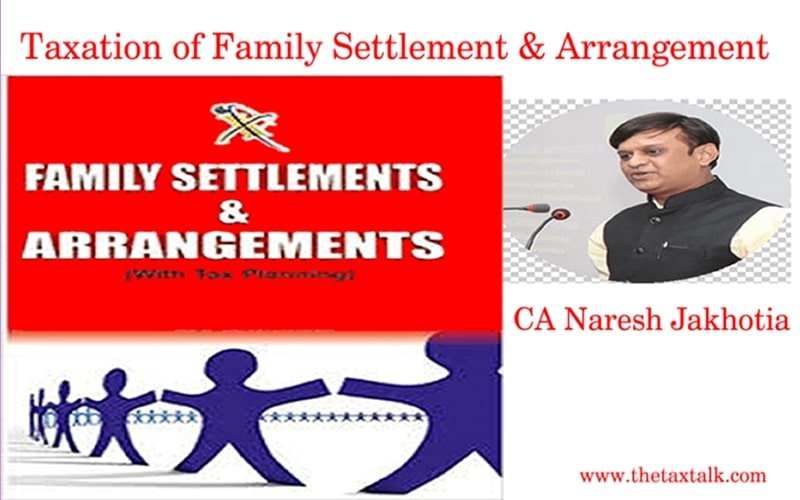![]()
Taxation of Family Settlement & Arrangement
Mahabharata happened due to family dispute over property. Be it ultra-rich families or Low-income households, disputes & litigation in the family for wealth have been always been a part of human civilisation. Even the will of the deceased is also subject to controversy, litigation & disputes. Taking the issue to the Court is time consuming, expensive, painful, affects the goodwill, reputation, peace of the family. Further, it may not always guarantee a satisfactory outcome. An instant & ultimate solution in all such cases is settlement/ arrangement/compromise amongst the family members.
Family settlement is basically an agreement wherein all the family members mutually work out the mode of distributing the wealth amongst themselves. Undeniably, all the parties to the settlement are well related to each other and have some valid legal claim over the disputed assets which could be immoveable property, shares, FDR, Jewellery etc. It is a quicker & more harmonious way to buy peace, retain goodwill & resolve disputes.
Halsbury’s Law of England defines a family arrangement as an agreement between members of the same family, intended to be generally and reasonably for the benefit of the family, either by compromising doubtful or disputed rights, or by preserving the family property or the peace and security of the family, by avoiding litigation or by saving its honour. In short, all such cases, wherein family members mutually agree to realign their respective rights in various assets owned by different family member, is referred to as family settlement/arrangements.
How to execute the family settlement deed:
Normally, a third person who may be some close & acceptable person to the family, a senior member of the family or lawyer or CA helps the family members to arrive at a mutually acceptable solution over the property dispute. It is then documented so as to give it a legal enforceable right to the members. It is signed by all the family members and attested by two witnesses. A duly executed family settlement cannot be revoked except without a court decree like in case of fraud, coercion, misrepresentation of facts, improper execution etc. Any documents including family settlement that intends to assign immovable property must be mandatorily registered u/s 17 of the Indian Registration Act.
Taxation:
- To give an effect, family settlement deed is normally followed by execution of various subsequent documents like gift deed, transfer deed, exchange deed, relinquishment deed etc so as to complete all the formalities enumerated in the overall original settlement document.
- It must be noted that every ‘transfer’ of property whether by way of exchange, relinquishment, extinguishment, etc attracts capital gain tax. As a family settlement may involve the transfer, exchange etc of assets among the members, a question may arise as to whether such transactions are covered under the definition of ‘transfer’ and subject to capital gains tax.
- The Income Tax Act does not have any specific provision to cover the tax issue arising from family settlement or arrangement. However, the courts have affirmed that family settlement deed is not a gift, relinquishment, exchange or transfer documents so as to attract the tax under the Income Tax Act-1961. Courts have held that a family arrangement merely represents the modus operandi for working out the rights in the common property of various members of the family & so it is tax neutral. Few of the judicial pronouncements over the issue are as under:i. Realignment of interest by way of family arrangements among the family members, cannot be construed a transfer and therefore, no liability of capital gains tax should arise in such cases- CIT vs AL Ramanathan 245 ITR 494 (Mad)ii. Even if bonafide disputes, present or possible, which may not involve legal claims are settled by bonafide family arrangement which is fair and equitable , the family arrangement is final and bidinding on the parties to the settlement – C.G.T. Vs D. Nagrirathinam (2004) 266 ITR 342 (Madras).iii. The transactions of a family settlement entered into by the parties for the purpose of putting an end to the disputes amongst family members doesn’t amount to transfer- CIT Vs. R. Poonnammal 164 ITR 706 (Mad).
iv. Family arrangement is a settlement which doesn’t involve any transfer. It cannot therefore give rise to liability for capital gain – CIT Vs. Ashwani Chopra 352 ITR 620 (P&H)
v. No capital gains would be attracted in case of a family settlement, as there is no transfer. However, transfer of a property by a company as a result of family settlement amongst family member is “transfer” and liable for capital gain tax.- B.A. Mohota Textile Traders Pvt Ltd vs DCIT (Bombay HC)
vi. Section 56(2) of the Income Tax Act is applicable wherever there is a transfer of assets for inadequate consideration or without consideration. However, the said provision is not applicable in case of transactions between the relatives.
[Readers may forward their queries at nareshjakhotia@gmail.com. Other articles & response to queries are available at www.theTAXtalk.com]

